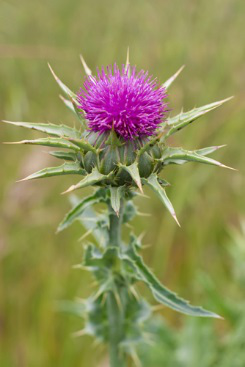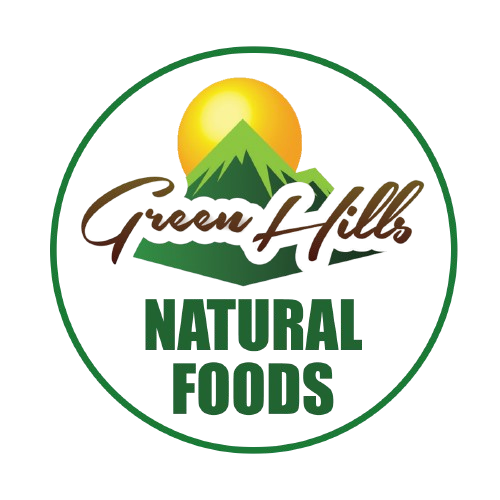Description
Botanical: Silybum marianum
Other common names: Mary Thistle, Wild Artichoke, Silybum, Marian Thistle, St. Mary's Thistle,
Lady Thistle, Holy Thistle
Did you know that your liver is the toxic waste disposal plant of your body? Keep it healthy and nourished with Milk Thistle. This remarkable herb is said to have no pharmaceutical equivalent for itsbeneficial effects on the liver, spleen and gallbladder. Rid yourself of toxins and symptoms of temporary depression, and boost your immunity with Milk Thistle. In the meantime, you'll also gain valuableantioxidant protection.
Country of Origin: Bulgaria
Beneficial Uses:
Milk Thistle is known to be extraordinarily useful as a tonic to safeguard the liver from all types of liver disorders. As a free-radical scavenger, it protects the liver from toxins and pollutants by helping to prevent free radical damage, and it also stimulates the production of new liver cells. It is considered a remarkable herb for relieving temporary discomforts associated with cirrhosis, alcoholic poisoning, jaundice, fatty liver, hepatitis and viral hepatitis. Placebo-controlled clinical studies show efficacy in reducing inflammatory aminotransferases in alcoholic liver disease. A flavonoid complex (silymarin) stimulates liver protein creation, enabling the organ to produce new liver cells and replace the old ones damaged by hepatitis infection or other toxins. Silymarin contains a number of active constituents called flavolignans, which are also used to help protect the liver from poisoning. Milk thistle provides hepatocellular protection by stabilizing hepatic cell membranes. It alters the structure of the outer cell membrane of the hepatocytes in such a way as to prevent the penetration of the liver toxins into the interior of the cell.
According to 2010 research, Milk Thistle may lessen inflammation for those undergoing chemotherapy. Moreover, the Milk Thistle treatment seems to help patients endure higher doses of chemotherapy. In the study, after 56 days of oral treatment with Milk Thistle in capsule form, the patients showedsignificantly lower levels of both aminotransferases (markers indicating inflammation in liver cells) and bilirubin (marker for liver cell damage). Although the research was conducted on patients with acute lymphoblastic leukemia, the American Cancer Society indicated that further study may show the way to see how effective it is for a longer course of treatment and whether it works well in reducing liver inflammation in other types of cancers and with other types of chemotherapy.
In the treatment of hepatitis C, the silymarin in Milk Thistle has been shown to lower liver enzymes and reverse the kind of liver damage common in people with hepatitis C.
Milk Thistle increases the production of bile, the fluid created in the liver that helps to break down fats in the small intestine. This helps to remove (via excretion) testosterone byproducts that cause acne. As a demulcent with mucilaginous properties, it soothes mucous membranes from irritating substances and helps to protect the intestinal lining (reducing inflammation of the intestine), alleviating the constipation of irritable bowel syndrome (IBS) and Crohn's disease, as well as other inflammatory bowel disorders.
By increasing the bile production and stimulating protein synthesis in the liver, Milk Thistle regulates the digestion of fats and may be beneficial in preventing arteriosclerosis and strokes, in addition to reducing the chances of gallstone formation by promoting total, normal cholesterol levels and helping the liver convert low-density lipoprotein (LDL or "bad cholesterol") into high-density lipoprotein (HDL or "good cholesterol"). Milk Thistle is also thought to prevent cholesterol that has been excreted into the bile from being reabsorbed into the body. Another compound in Milk Thistle stops the oxidation of LDL cholesterol into a form that creates plaques in the linings of artery walls.
Milk Thistle is believed to detoxify the liver and gallbladder and the poisons that enter our blood stream by enhancing overall liver function. The herb has been effective in countering the toxic effects of nicotine, alcohol, carbon monoxide pollutants, dry-cleaning fluid and cadmium. Thousands of years ago the herb was prescribed to counteract the poison of snakebite, and current research shows that Milk Thistle does, in fact, combat the poisonous activity of many toxins, including the deadly mushroom poisoning of Death Cap.
Milk Thistle is not only a rebuilding herb for the liver and gallbladder, it is believed to also protect the kidneys, brain and other tissues from chemical toxins. Using the herb is believed to protect against inflammation of the bile ducts.
Milk Thistle regulates the digestion of fats and alleviates common stomach problems, such as nausea, lack of appetite and dyspepsia, and it may also help ease abdominal distention and fatigue.
Milk Thistle is thought to help to protect specialized immune cells in the liver known as Kuppfer cells by engulfing bacteria, toxins and other invasive matter from entering into the liver and may destroy harmful cells that have entered blood circulation as the first step in spreading to other parts of the body.
According to a clinical summary from Memorial Sloan-Kettering, animal models suggest that flavonoids in Milk Thistle may have antioxidant and anticancer effects. Flavonoids isolated from Milk Thistle have been shown to inhibit malignant colon and prostate cells in rats. However, to date there is no evaluation of survival or quality of life.
Chronic liver damage sometimes results in diabetes, in which the liver is no longer able to respond to insulin, and Milk Thistle has been said to help promote and regulate normal blood sugar levels and may also help to actually lower blood sugar.
Further supporting the issue of healthy blood sugar levels, Milk Thistle's silymarin is thought to control sugar in Type-2 Diabetes. In an article published in Phytotherapy, it was noted that the silymarin extracted from seeds of the Milk Thistle showed that this extract can help people significantly lower the amount of sugar bound to haemoglobin in blood, as well as reducing fasting blood sugar levels.
For thousands of years Milk Thistle has been used to promote lactation and increase the production of breast milk in nursing mothers.
Contraindications:
Currently, there are no warnings of contraindications with the use of Milk Thistle; however, the herb may reduce the efficacy of birth control pills and medicine to treat infection (metronidazole, erythromycin, etc.). It is essential that people with diabetes and liver disease should have regular blood tests. Those who suffer from allergies to members of the Compositae (daisy) family (ragweed) may want to consult a doctor or allergist before using Milk Thistle. There have been rare reports of diarrhea and nausea. Some herbalists suggest taking Milk Thistle on an ongoing basis for four weeks on, two weeks off for optimum efficacy.


